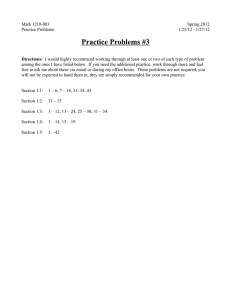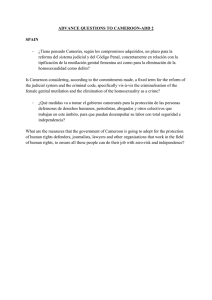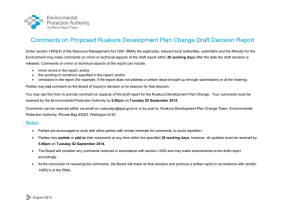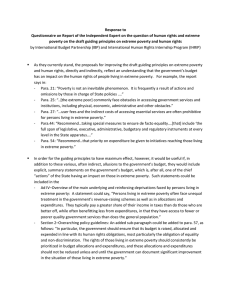RESPONSE TO THE QUESTIONNAIRE ON THE
advertisement
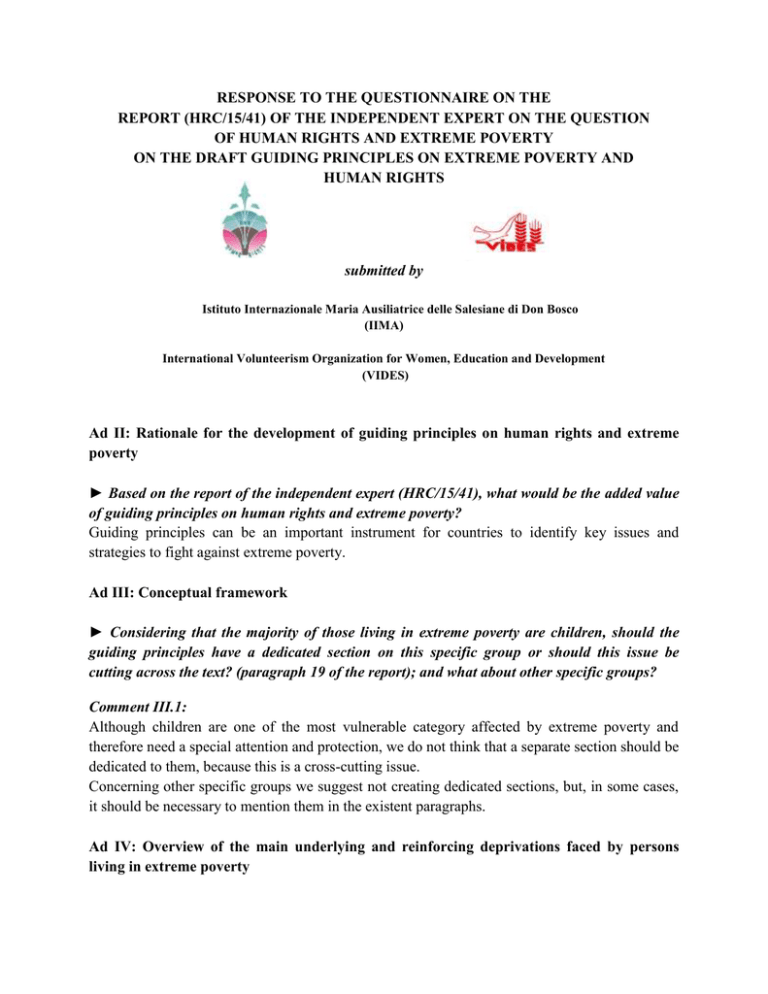
RESPONSE TO THE QUESTIONNAIRE ON THE REPORT (HRC/15/41) OF THE INDEPENDENT EXPERT ON THE QUESTION OF HUMAN RIGHTS AND EXTREME POVERTY ON THE DRAFT GUIDING PRINCIPLES ON EXTREME POVERTY AND HUMAN RIGHTS submitted by Istituto Internazionale Maria Ausiliatrice delle Salesiane di Don Bosco (IIMA) International Volunteerism Organization for Women, Education and Development (VIDES) Ad II: Rationale for the development of guiding principles on human rights and extreme poverty ► Based on the report of the independent expert (HRC/15/41), what would be the added value of guiding principles on human rights and extreme poverty? Guiding principles can be an important instrument for countries to identify key issues and strategies to fight against extreme poverty. Ad III: Conceptual framework ► Considering that the majority of those living in extreme poverty are children, should the guiding principles have a dedicated section on this specific group or should this issue be cutting across the text? (paragraph 19 of the report); and what about other specific groups? Comment III.1: Although children are one of the most vulnerable category affected by extreme poverty and therefore need a special attention and protection, we do not think that a separate section should be dedicated to them, because this is a cross-cutting issue. Concerning other specific groups we suggest not creating dedicated sections, but, in some cases, it should be necessary to mention them in the existent paragraphs. Ad IV: Overview of the main underlying and reinforcing deprivations faced by persons living in extreme poverty ► Would you identify other underlying and reinforcing deprivations and obstacles faced by persons in extreme poverty, in addition to the ones included in this section of the report? Comment IV.1: The part relating to the overview of the main underlying and reinforcing deprivations faced by persons living in extreme poverty is exhaustive and comprehensive. Ad V: Proposal for improving the draft guiding principles on extreme poverty and human rights ► Are there any important aspects or issues missing in the annotated outline for guiding principles proposed in this section of the report? Section V.1: Overarching human rights principles ► Is the list of human rights principles in this section (headings A to G) sufficiently comprehensive or should any other principles be included in the guiding principles on extreme poverty and human rights? ► Are there any important aspects or issues missing in the recommendations in bold proposed under each of the overarching human rights principles in this section of the report? Comment 1 Para 46: According to us, in Para.46, recommendation 4 it should be added the words underlined in yellow, as follows: Recommend measures to ensure that women have full and equal access to social services, including health, education, equal access to the labour market and equal pay and condition, equality between the sexes in marriage and family relations, ensuring that women’s decisionmaking is not subject to male authority. Comment 2 Para. 48: According to us, in Para.48, recommendation 2 it should be added the words underlined in yellow, as follows: Call for specific measures to ensure at all levels (local, national and international) adequate representation in the decision making processes of groups that are at higher risk of falling into extreme poverty such as children, women, indigenous peoples, racial, religious, ethnic and other minorities, older persons and persons with disabilities. Comment 3 Para. 50: According to us, in Para.50, recommendation 2 it should be added the words underlined in yellow, as follows: Recommend that States make publicly available, accessible and understandable for all information about issues of particular concern to those living in extreme poverty, such as information relating to service provision and availability of public resources. Section V.2: Overarching policy guidelines ► Is the list of ‘overarching policy guidelines’ in this section (headings H to K) sufficiently comprehensive or should any other overarching policy guidelines be included in the guiding principles? Comment V.2: The list is comprehensive. ► Are there any important aspects or issues missing in the recommendations in bold proposed under each of the overarching policy guidelines in this section of the report? Comment 1 Para. 54: Concerning Para.54 we suggest to include a forth recommendation, which should states as follows: Recommend that States set specific measure to monitor the implementation of programmes and public policies aimed at reducing extreme poverty Section V.3: Specific rights-based obligations ► Is the list of rights identified in this section sufficiently comprehensive (headings L to W) or any other human rights should be also reflected in the guiding principles? Comment V.3: The list of rights is comprehensive. ► Are there any important aspects or issues missing in the recommendations on bold proposed under each of the specific rights-based obligations in this section of the report? Comment 1 Para. 64: According to us, in Para.64, recommendation 1 it should be added the words underlined in yellow, as follows: Recommend the allocation of the necessary resources to establish registration systems that are accessible to, free and adequate for persons living in extreme poverty. Effective registration systems not only require adequate financial and human resources, but must be based on regulatory frameworks recognizing the human right of every person to recognition before the law. Regulatory frameworks must also protect the human right to privacy. Comment 2 Para. 64: According to us, in Para.64, recommendation 3 it should be added the words underlined in yellow, as follows: Give particular attention to addressing the legal, economic, procedural, practical and cultural barriers that impede women, girls, refugees, migrants, indigenous peoples, persons with disabilities, minorities, and other groups such as orphans, street children and children born in emergency situations or in remote areas from registering. Recommend that States introduce awareness-raising campaigns to inform persons living in extreme poverty about registration processes and their importance. Comment 4 Para. 70: According to us, in Para. 70, recommendation 2 it should be added the words underlined in yellow, as follows: Recommend investing in accessible early warning mechanisms and providing adequate assistance to victims of violence, and ensuring accountability for violent occurrences. Further recommend the adoption of measures to assist groups at greater risk of poverty, such as women, children, persons with disabilities, indigenous peoples, refugees and migrants, and people living in emergency situation. Comment 5 Para. 70: According to us, in Para. 70, recommendation 3 it should be added the words underlined in yellow, as follows: Recommend adopting specific measures to prevent, monitor and punish violence perpetrated by State and non-state agents against persons living in extreme poverty. Reaffirm the need to repeal inadequate legislation, for instance vagrancy laws, and establish clear accountability systems. Comment 6 Para. 89: We consider important to include a reference to nutritional support for children because only healthy children can participate adequately in all educational activities. According to us, in Para. 89, recommendation 1, it should be added the words underlined in yellow, as follows: Recall the State obligation to immediately ensure free and compulsory primary education for all, within safe reach and without indirect costs. Such obligations require implementing policies on both the demand and supply sides: on the supply side, providing the necessary school infrastructure (buildings, adequate services and facilities including sanitation, water, and electricity for low-income settlements); nutritional support for children and school materials ( books, computers, etc..). On the demand side, ensuring that families and communities are not dependent on child labour to live in dignity. Comment 7 Para. 89: According to us, in Para. 89, recommendation 2 it should be added the words underlined in yellow and delete the words in red, as follows: Recommend progressively ensuring the availability, accessibility, acceptability, and adaptability and quality of education in all forms and at all levels. This includes allocating resources in priority towards persons living in extreme poverty, for example with proactive measures to combat school dropout and to compensate for socio-economic disadvantage. Comment 8 Para. 89: Concerning Para. 89 and the importance of the quality education we suggest including a third recommendation on this issue. In fact, in our opinion, quality education is crucial to ensure the empowerment of children for improving a country’s social, economic and cultural conditions. Furthermore, some important key concepts should be considered. Firstly primary education is not enough, because if primary education is designed to provide children with the basic tools they need, secondary education is about consolidating the talents students already possess. Secondly, curricula should be pertinent and relevant, in fact, curricula must take into account the purpose of education in a society. Thirdly, teachers and educators should be adequately trained in order to guarantee a high level of education that respond to the local necessities. Fourthly, public funding in education should be sufficient to guarantee adequate educational facilities and dignity salaries for educators. Recommend States to ensure a quality education guaranteeing desirable characteristics of learners (healthy, motivated students) and educators (adequately trained and paid teachers using active pedagogies), content (relevant curricula that respond to the needs and priorities of the learners, their families, and communities) and systems (good governance and equitable resource allocation). Comment 9 Para. 89: According to us, in Para. 89, recommendation 3 (according to what we said above this third recommendation should become the forth one) it should be added the words underlined in yellow, as follows: Recommend taking special measures to ensure the education of girls, children with disabilities, minorities, indigenous peoples, refugees, migrants, stateless persons, and those living in remote areas and slums, , and in specific situations (emergency, conflict) as being especially vulnerable and marginalized.
